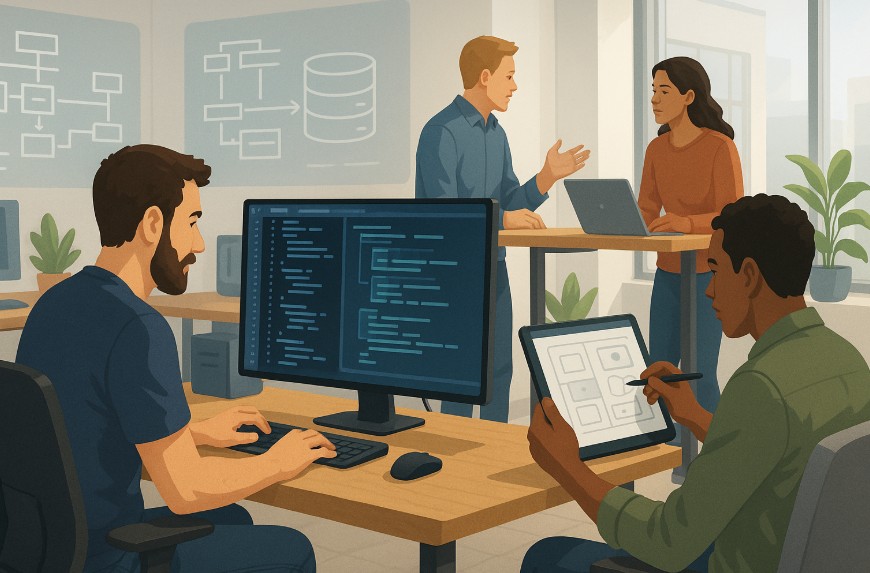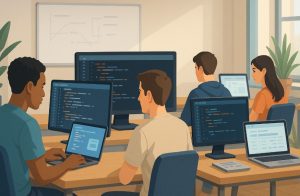
What makes a truly competent software developer in today’s technology-driven world? With industries increasingly reliant on digital solutions, software development has evolved beyond writing lines of code. It’s a field that requires a blend of technical knowledge, strategic thinking, and collaborative abilities.
Understanding what skills are essential for a software developer is crucial not only for career starters but also for professionals aiming to advance in the tech industry.
In this guide, we’ll explore the essential technical and soft skills required for software development, why they matter, and how they contribute to building high-quality software that solves real-world problems.
What Are Software Developer Skills and Why Do They Matter?

Software developer skills refer to the diverse competencies, both technical and interpersonal, that enable professionals to design, build, test, and maintain computer programs and applications. These skills span across coding, user interface design, testing, data handling, project management, and more.
A well-rounded software developer not only understands the underlying technical concepts but also communicates effectively with cross-functional teams, resolves problems systematically, and adapts to changing technologies. These abilities are essential in today’s collaborative and fast-paced work environments.
Employers seek developers with strong foundational skills who can contribute immediately, adapt quickly, and think critically under pressure. Including these skills on your CV doesn’t just boost your visibility, it positions you as a valuable asset.
Why Is Knowledge of Data Structures and Algorithms Crucial?
One of the most foundational skills in software development is the ability to work with data structures and algorithms. These are essential tools that allow developers to organise data, optimise performance, and solve complex problems efficiently.
When working on large-scale applications or systems that require handling millions of records, the efficiency of code becomes vital. Algorithms help determine the fastest and most memory-efficient solution, while data structures like arrays, linked lists, hash tables, and trees ensure the data is stored and accessed effectively.
Early in their careers, many developers underestimate the importance of DSA. But once they begin working on real-world systems, the impact of time and space complexity on performance becomes apparent. Mastery in this area is often the deciding factor in successful job interviews with top tech firms.
Popular platforms to learn and practice:
- GeeksforGeeks
- LeetCode
- HackerRank
- Codeforces
- InterviewBit
Which Programming Languages Should Developers Learn First?
The ability to write clean, efficient, and maintainable code is the cornerstone of software development. This begins with learning a programming language thoroughly. Developers aren’t expected to master every language, but a strong command of at least one, along with a working knowledge of others, is highly advantageous.
Languages are often chosen based on project requirements. For example, Python is widely used in data science and automation, Java and C# in enterprise systems, JavaScript in web development, and C++ in systems programming.
Here is a simplified comparison:
| Language | Use Case |
| Python | Data science, automation, web back-end |
| JavaScript | Front-end, full-stack web development |
| Java | Enterprise software, Android apps |
| C++ | Game development, high-performance systems |
| PHP | Web back-end scripting |
| SQL | Data querying and database management |
Selecting the right language depends on your career path and personal interest, but whichever you choose, depth of understanding is more valuable than breadth of exposure.
How Important Is Source Control for Software Teams?
Version control systems are essential for managing changes in code across teams and development cycles. They allow multiple developers to work on the same codebase simultaneously without conflict, track historical changes, and revert to previous versions when necessary.
Git, the most widely used version control system, has become an industry standard. Platforms like GitHub, GitLab, and Bitbucket offer collaborative environments where developers can submit code, conduct peer reviews, and manage issues and tasks.
Understanding source control isn’t just about committing code. It’s about learning branching strategies, pull requests, merging conflicts, and CI/CD pipelines. This knowledge is crucial for working in Agile teams and ensuring streamlined development processes.
Why Are Text Editors Essential for Developers at Every Level?
Regardless of experience level, every developer interacts with text editors. These are lightweight tools designed for editing code and configuration files. While IDEs are more feature-rich, text editors are often preferred for quick edits, remote development, or when working with lightweight scripts.
Text editors like Notepad++, Sublime Text, Visual Studio Code, and Atom support multiple programming languages and offer features like syntax highlighting, auto-completion, and plugin support. Learning the keyboard shortcuts and features of your preferred text editor can greatly improve productivity.
What Role Do IDEs Play in Efficient Software Development?

IDEs (Integrated Development Environments) are advanced tools that provide a comprehensive workspace to develop, debug, and deploy software. They combine text editing, code compilation, debugging, and integration tools into one platform.
For instance:
- Visual Studio is ideal for .NET and C++ development.
- Eclipse and IntelliJ are popular among Java developers.
- PyCharm is preferred for Python coding.
IDEs offer features like:
- Real-time error detection
- Code suggestions
- Step-by-step debugging
- Integrated version control
These capabilities significantly reduce development time and help maintain code quality.
Why Is Database Knowledge Indispensable in Software Projects?
Most software applications rely on data, whether it’s user information, transactions, or content management. Understanding how to interact with databases is a core skill for developers.
Relational databases like MySQL, PostgreSQL, and SQL Server are structured and use SQL for data querying. On the other hand, NoSQL databases like MongoDB and Cassandra are more flexible, storing unstructured data for web-scale applications.
A developer must be capable of:
- Writing queries for data retrieval
- Performing CRUD operations
- Designing relational models
- Ensuring data security and integrity
Why Should Developers Understand Operating Systems Internals?
While developers may not be OS engineers, having a working knowledge of operating systems is essential. Software does not exist in isolation, it interacts with hardware, memory, processes, and user environments.
Knowing how the OS handles:
- Memory management
- Threading
- Process scheduling
- File handling
can help debug issues like crashes, performance bottlenecks, and resource conflicts.
Linux, Windows, and macOS are common platforms, and developers working in mobile environments should also understand Android and iOS.
How Critical Is Networking Knowledge for Application Developers?

Today’s applications are rarely standalone. Whether it’s a mobile app, website, or enterprise system, they communicate across networks using protocols like HTTP, FTP, TCP/IP, and HTTPS.
A developer should understand:
- How client-server architecture works
- What DNS, IP addressing, and VPNs are
- How to troubleshoot network-related issues
This knowledge is essential in web development, cloud platforms, and distributed systems.
What Are the Essential Software Testing Techniques Developers Must Know?
Testing is the process of verifying that software meets its intended functionality without errors. Developers should not only write functional code but also test it thoroughly.
Three primary types of testing include:
- Unit Testing: Verifies individual components or functions.
- Integration Testing: Ensures modules interact correctly.
- System Testing: Validates the complete application in a production-like environment.
Knowing testing frameworks like JUnit, NUnit, or PyTest, and understanding test-driven development (TDD) can significantly enhance software reliability.
Why Should Developers Embrace Cross-Platform Development?
Today’s software must work on a wide range of platforms Windows, MacOS, Linux, Android, iOS, and more. Developing cross-platform applications enables broader reach and easier maintenance.
Cross-platform frameworks include:
- Flutter (Google)
- React Native (Facebook)
- Xamarin (Microsoft)
These tools help write once and deploy anywhere, reducing development time and ensuring consistent user experiences.
How Important Is Encryption and Cryptography in Secure Coding?

Security is a growing concern in the digital age. Developers must ensure user data is protected during storage and transmission.
Encryption converts plain data into unreadable formats using algorithms.
There are two primary methods:
- Symmetric encryption (e.g., AES)
- Asymmetric encryption (e.g., RSA, DSA)
Incorporating cryptography principles ensures software can resist attacks and comply with industry standards like GDPR and PCI-DSS.
What Is SDLC and Why Must Developers Know It?
The Software Development Life Cycle (SDLC) outlines the structured phases of software creation. Understanding this cycle helps developers align with business goals and deliver high-quality products.
The seven phases are:
- Requirement analysis
- Planning
- System design
- Implementation
- Testing
- Deployment
- Maintenance
Knowledge of SDLC methodologies like Waterfall, Agile, or DevOps is vital for participating in enterprise-level projects.
Why Is Spreadsheet Proficiency Still Useful for Developers?
Spreadsheets like Microsoft Excel are powerful tools beyond simple data entry.
Developers use them for:
- Data manipulation and validation
- Project tracking
- Import/export of datasets
- Visualising performance metrics
Excel also supports scripts and macros, which can automate repetitive tasks.
How Do Object-Oriented Design Principles Influence Code Quality?

Object-Oriented Programming (OOP) focuses on real-world modelling using objects. It promotes clean, reusable, and modular code.
Key principles include:
- Encapsulation: Hiding internal data
- Abstraction: Simplifying complexity
- Inheritance: Reusing existing code
- Polymorphism: Interchanging similar objects
Understanding these principles improves architecture and makes debugging easier.
How Relevant Is Cloud Computing in Modern Development?
With businesses migrating to the cloud, developers must understand platforms like AWS, Azure, and Google Cloud. Cloud computing enhances scalability, availability, and performance.
Cloud-savvy developers can:
- Set up virtual machines
- Deploy scalable web apps
- Manage storage and databases
- Integrate with APIs and DevOps tools
Cloud knowledge is often a requirement in enterprise job listings today.
How Can Developers Continue Growing Their Skillset?
To build and maintain a successful career in software development, continuous improvement is non-negotiable.
Strategies include:
- Identifying skill gaps and setting learning goals
- Attending workshops and online courses
- Joining developer communities
- Finding a mentor or coach
- Asking for feedback and learning from mistakes
This culture of growth ensures developers remain competitive and innovative.
What Qualities Define a Good Software Developer?

While technical skills are critical, soft skills and a professional attitude are equally important.
A great developer demonstrates:
- Curiosity and willingness to learn
- Problem-solving mindset
- Effective time management
- Strong communication skills
- Empathy and teamwork
These qualities build trust and drive success in collaborative environments.
FAQs
What is the first skill to learn in software development?
Start with learning a programming language and basic algorithms to understand how code solves problems.
Do I need a degree to become a software developer?
While helpful, many successful developers are self-taught through online courses, bootcamps, and projects.
Which database should I start with?
Begin with SQL-based databases like MySQL or PostgreSQL before exploring NoSQL options.
Is software testing a developer’s responsibility?
Yes, developers are often responsible for unit testing and sometimes integration testing during development.
Can I develop apps for all platforms with one codebase?
Yes, using cross-platform frameworks like Flutter or React Native allows you to build apps for multiple platforms.
How important is debugging in software development?
Very important. Debugging helps identify and fix errors, ensuring your code functions as intended.
What is the best way to practice coding daily?
Use platforms like LeetCode, HackerRank, and Codeforces for daily problem-solving challenges.